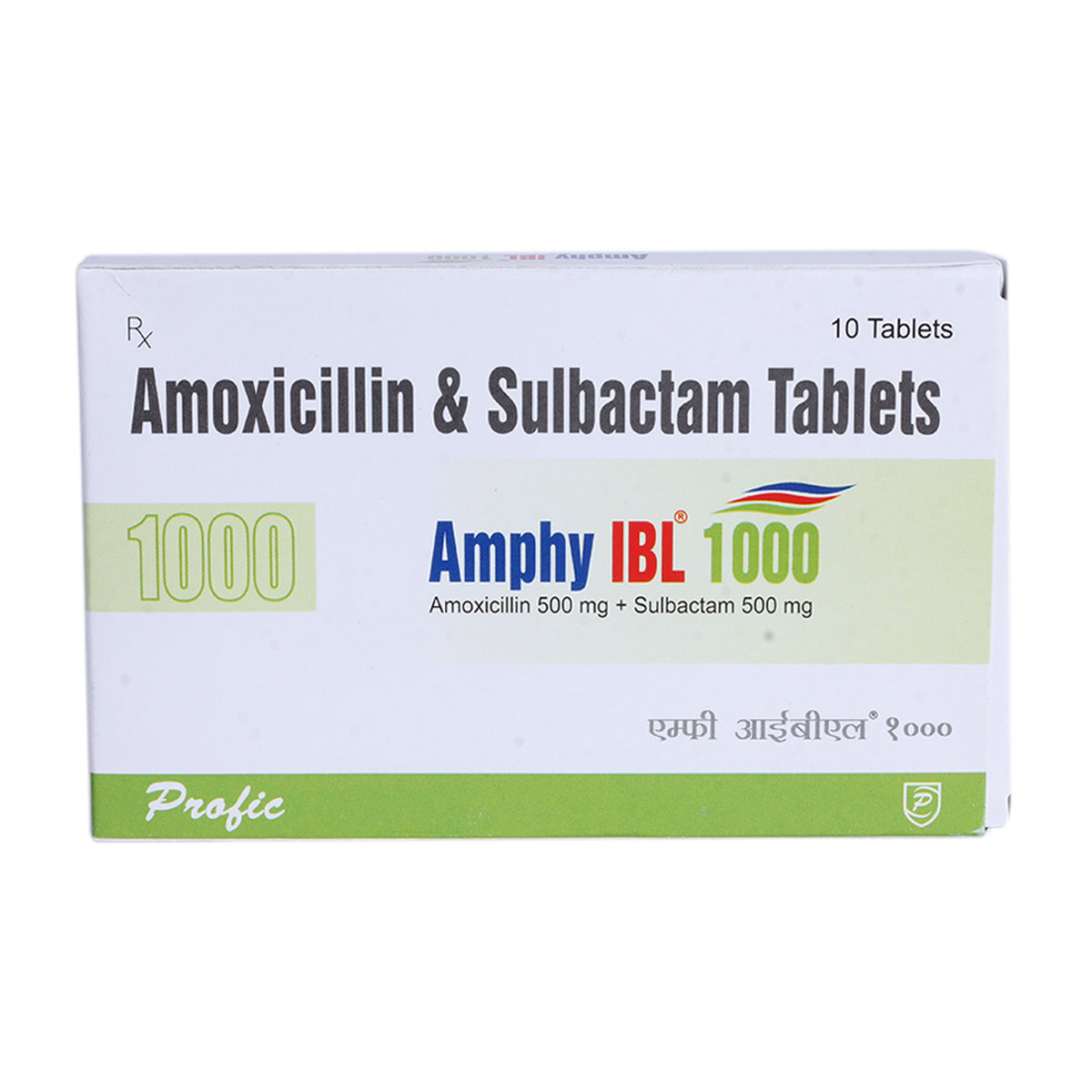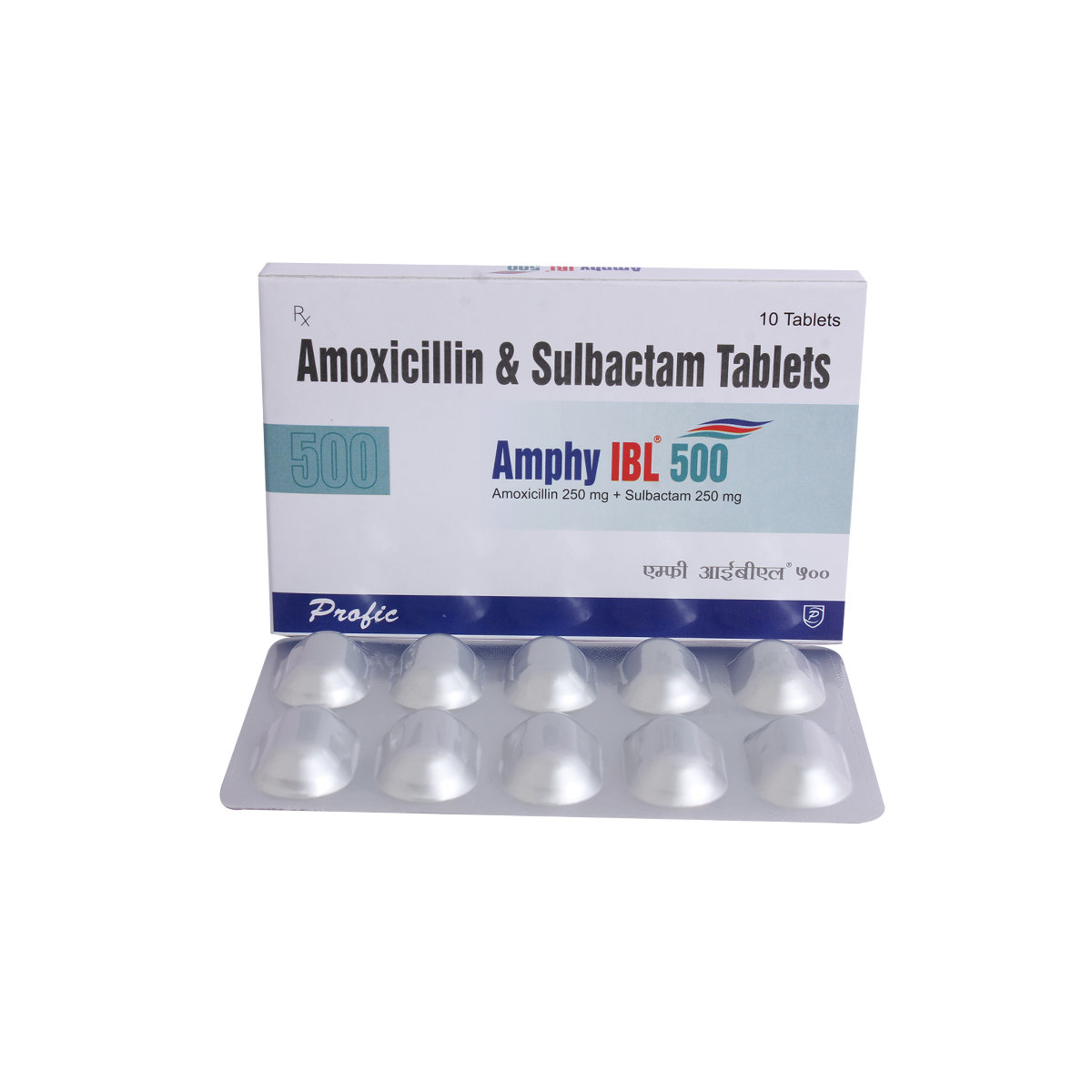Amoxycillin+sulbactam
About Amoxycillin+sulbactam
Amoxycillin+sulbactam belongs to the group of medications called antibiotics, used to treat bacterial infections. It is used to treat a range of bacterial infections, including tonsillitis, sinusitis, ear infections, respiratory and urinary tract infections, skin infections like boils and abscesses, wound infections, bone infections, and oral cavity infections. Bacterial infections are caused by the multiplication of harmful bacteria inside or on the body. These harmful bacteria produce chemicals known as toxins, which can damage tissue and make you sick. Symptoms of bacterial infection vary depending on the organ affected by the bacteria.
Amoxycillin+sulbactam contains Amoxycillin and Sulbactam. Amoxycillin is an antibiotic that stops bacteria from forming a protective covering, which is essential for their survival. Sulbactam, a beta-lactamase inhibitor, works in conjunction with amoxycillin to overcome bacterial resistance and enhance its effectiveness. Thus, Amoxycillin+sulbactam effectively prevents and treats bacterial infections.
You should take this medicine exactly as the doctor prescribed it based on your medical condition. The common side-effects of Amoxycillin+sulbactam include diarrhoea, nausea, and vomiting. These side effects are usually mild and temporary. However, if any of these side effects persist or get worse, inform your doctor immediately.
Do not discontinue or abruptly stop the medication, as it may lead to antibiotic resistance, a condition in which bacteria become resistant to antibiotics. Amoxycillin+sulbactam should be used with caution in children, pregnant women, breastfeeding mothers and elderly people. It is not known whether Amoxycillin+sulbactam interacts with alcohol or if it may affect your ability to drive. So, please discuss with your doctor the possible risks and benefits before consuming alcohol with Amoxycillin+sulbactam.
Uses of Amoxycillin+sulbactam
Medicinal Benefits
Amoxycillin+sulbactam is used to treat a range of bacterial infections, including tonsillitis, sinusitis, ear infections, respiratory and urinary tract infections, skin infections like boils and abscesses, wound infections, bone infections, and oral cavity infections. It contains Amoxycillin and Sulbactam. Amoxycillin is an antibiotic that stops bacteria from forming a protective covering, which is essential for their survival. Sulbactam, a beta-lactamase inhibitor, works in conjunction with amoxycillin to overcome bacterial resistance and enhance its effectiveness in fighting infections.
Directions for Use
- Amoxycillin+sulbactam can be taken with or without food as advised by the doctor.
- Follow your doctor's instructions on the dosage and timing of this medication to ensure safety.
- Swallow Amoxycillin+sulbactam as a whole with a glass of water.
- Do not chew, crush or break it.
Storage
Side Effects of Amoxycillin+sulbactam
- Diarrhea
- Nausea
- Vomiting
Drug Warnings
Amoxycillin+sulbactam is not recommended to take Amoxycillin+sulbactam if you are allergic to penicillin, other antibiotics, or this medicine's contents. Amoxycillin+sulbactam should not be given to people with infectious mononucleosis (viral infection with sore throat and fever) and colitis (intestinal inflammation). Amoxicillin in Amoxycillin+sulbactam may reduce the effectiveness of birth control pills. To prevent pregnancy, consider using an additional form of contraception while taking Amoxycillin+sulbactam by consulting your doctor for guidance. Amoxycillin+sulbactam should be used with caution in patients with kidney impairment. Do not discontinue or abruptly stop the medication, as it may lead to antibiotic resistance, a condition in which bacteria become resistant to antibiotics. Amoxycillin+sulbactam should be used with caution in children, pregnant women, breastfeeding mothers and elderly people. It is not known whether Amoxycillin+sulbactam interacts with alcohol or if it may affect your ability to drive. So, please discuss with your doctor the possible risks and benefits before taking alcohol along with Amoxycillin+sulbactam.
Drug Interactions
Drug-Drug Interactions: Amoxycillin+sulbactam may interact with aminoglycosides (gentamicin), blood thinners (warfarin), and anti-rheumatic drugs (methotrexate).
Drug-Food Interactions: Alcohol may increase the side effects of Amoxycillin+sulbactam. Hence, it is advised to limit the intake of alcohol while using Amoxycillin+sulbactam.
Drug-Disease Interactions: Amoxycillin+sulbactam may interact with certain disease conditions, such as colitis (inflammation of the intestine's lining), mononucleosis (a viral infection characterised by a sore throat and fever), and severe kidney impairment.
Drug-Drug Interactions Checker List:
Safety Advice

Alcohol
cautionIt is unknown whether Amoxycillin+sulbactam interacts with alcohol. However, as a precautionary measure, it is advisable not to take or limit alcohol.

Pregnancy
cautionPlease consult a doctor if you are pregnant. Amoxycillin+sulbactam is given to pregnant women only if the doctor thinks the benefits outweigh the risks.

Breast Feeding
cautionPlease consult a doctor if you are breastfeeding. Amoxycillin+sulbactam is given to breastfeeding mothers only if the doctor thinks the benefits are greater than the risks.

Driving
cautionIt is not known whether Amoxycillin+sulbactam alters your ability to drive. Do not drive or operate machinery if you experience any symptoms that affect your ability to concentrate and react. Seek medical attention if the symptoms persist longer.

Liver
cautionAmoxycillin+sulbactam should be used with caution in patients with liver diseases as it may affect liver function. The dose may have to be adjusted by your doctor. Please consult the doctor.

Kidney
cautionAmoxycillin+sulbactam should be used with caution in patients with kidney diseases. Please consult the doctor, your doctor will weigh the benefits and any potential risks before prescribing Amoxycillin+sulbactam.

Children
cautionAmoxycillin+sulbactam should be used in children only if clinically needed. The doctor may have to adjust the dose based on age, body weight and medical history.
Habit Forming
Diet & Lifestyle Advise
- Taking probiotics after antibiotic treatment can reduce the risk of antibiotic-associated diarrhoea. Certain fermented foods, such as yoghurt, cheese, sauerkraut, kombucha, and kimchi, can help restore the intestine's good bacteria.
- Include more fibre-enriched food in your diet, as it can be easily digested by your gut bacteria, which helps stimulate their growth. Thus, fibre-rich foods may help restore healthy gut bacteria after a course of antibiotics. Whole grains like whole-grain bread and brown rice should be included in your diet.
- Avoid alcoholic beverages with Amoxycillin+sulbactam as it can make you dehydrated and may affect your sleep. This can make it harder for your body to help Amoxycillin+sulbactam fight off infections.
Special Advise
- Even if you feel better after taking Amoxycillin+sulbactam, do not stop taking it until your doctor says so. This might cause the symptoms to reappear and make the infection difficult to treat due to antibiotic resistance.
Patients Concern
Disease/Condition Glossary
Bacterial infections: A bacterial infection is a condition in which harmful bacteria enter, multiply and infect the body. It can target any organ of the body and multiply very quickly. Many bacteria give off chemicals called toxins, which can damage tissue and make you sick. Bacterial infections vary from minor illnesses (like sore throat and ear infections) to severe brain infections (like meningitis and encephalitis). When infected with bacteria, you can experience generalised symptoms like fevers, chills and fatigue. A few harmful bacteria that commonly cause infections include Streptococcus, Staphylococcus and E. coli. Anyone can contract a bacterial infection, but individuals with a weakened immune system or those taking immunosuppressive medications, such as steroids, are more susceptible to infections.
FAQs
Amoxycillin+sulbactam belongs to the group of medications called antibiotics, used to treat bacterial infections. It is used to treat a range of bacterial infections, including tonsillitis, sinusitis, ear infections, respiratory and urinary tract infections, skin infections like boils and abscesses, wound infections, bone infections, and oral cavity infections.
Amoxycillin+sulbactam contains Amoxycillin and Sulbactam. Amoxycillin is an antibiotic that stops bacteria from forming a protective covering, which is essential for their survival. Sulbactam, a beta-lactamase inhibitor, works in conjunction with amoxycillin to overcome bacterial resistance and enhance its effectiveness. Thus, Amoxycillin+sulbactam effectively prevents and treats bacterial infections.
No, it is a prescribed drug given by a physician to prevent specific medical conditions. Taking it on your own can cause unwanted side effects.
Amoxycillin+sulbactam is safe if used in the dose and duration recommended by your doctor. Take it precisely as directed, and do not skip any dose. Follow your doctor's guidelines carefully and inform your doctor if any of the side effects disturb you.
Take the missed dose as soon as possible. However, skip the missed dose and return to your regular dosing schedule if it is time for the next dose. Do not take a double dose to make up for the dose that you missed.
Do not stop using Amoxycillin+sulbactam even if you feel better. It should be strictly used as advised by your doctor to avoid the recurrence of symptoms and the worsening of the disease.
Amoxycillin+sulbactam should not be given to people with infectious mononucleosis (viral infection with a sore throat and fever) and colitis (inflammation of the intestine) as Amoxycillin+sulbactam may worsen these conditions.
Amoxycillin+sulbactam may cause diarrhoea, so notify your doctor immediately if you develop watery and bloody stools with or without stomach cramps or fever.






